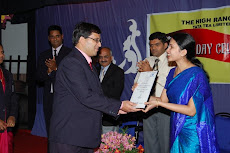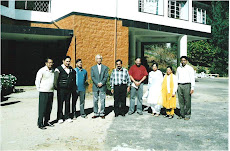Reviewed by C. Radhakrishnan
Jack Welch, famous for being a respected business manager and former CEO of the American General Electric (GE) conglomerate and for his popular book called "Jack: Straight from the Gut". It's not frequently that an executive of Jack Welch's calibre shares his insight into management and management philosophy.
The book, ‘Winning’ has evolved from thousands of questions asked of Welch when speaking to audiences around the world. When he speaks, anyone who wants to learn to run an operation more effectively should pay attention. I have come to know about him from Dhruv Academy Library. This is the first book I have borrowed from the amazing collection of books in our library.
I was fascinated to learn that Jack Welch's education background wasn't in business. He has a doctorate in physics. He is the outstanding example of General Electric's management development program. His honest, be-the-best style of management became the gold standard in business, with his relentless focus on people, teamwork and profits.
Welch starts out ‘Winning’ by explaining what a mission statement is. Instead of platitudes about quality and service, Welch believes an effective mission statement should answer one question, "How do we intend to win in this business?" For example, the mission statement at GE from 1981 through 1995 said it was going to be "the most competitive enterprise in the world" by being No. 1 or No. 2 in every market. The mission statement guided the corporation's management to fix, sell or close every underperforming business that didn't meet the corporate requirements.
Once the mission is established, a company should define its values. The corporate values are behaviours, how the mission is to be carried out to win. Values, he says, “people must be able to use them as marching orders because they are the ‘how’ of the mission, the means to the end – winning.”
In the first part, he stresses the significance of candor - open communication - to business success. When an institution has a high degree of candor, everything operates faster and better. In some companies, people are afraid to communicate straightforwardly or put forth ideas that stimulate real debate. Presenting new ideas or criticism of practices with candor brings issues to the forefront so they can be dealt with much more quickly. I feel it’s applicable to educational institutions too.
In people management he says, “You’ve got the right players on the field – that’s great start. Now they need to work together, steadily improve their performance, be motivated, stay with the company, and grow as leaders.” For this to happen we have to place the right people at the right position in the field but many times people go wrong here and the whole setup collapses even after having talented people.
The more controversial comments in ‘Winning’ may relate to differentiation and managing people. According to Welch, managers should assess their employees and separate them into three categories of performance: the top 20%, middle 70% and bottom 10%, then act on the distinction. The top 20% should be treated as stars, rewarded and nurtured. Management of the middle 70% should focus on training, positive feedback and thoughtful goal setting, including identifying people with potential to move up and cultivating them. The bottom 10% has to go. Welch sees terminating these people as a humane action that may free these employees to pursue successful careers at companies and in pursuits where they truly belong and at which they excel. I wish, this must happen in our schools, then the life of many ‘so called teachers’ could be saved and students learning experience would become more enjoyable and purposeful.
This is just a sample of Welch's corporate wisdom. The book is meant to big organisations, but there is information here that can be translated and adapted by entrepreneurs, smaller companies and edupreneurs. I really feel many of the management strategies of this book are very much applicable to educational institutions like schools in our country. At the end in ‘Here, There and Everywhere’, Welch includes questions of his philosophy with responses. If you are concerned with running an organisation/school/college more effectively, you will want to read and study Winning.
Book Courtesy: Dhruv Academy Library, Sangamner
Jack Welch, famous for being a respected business manager and former CEO of the American General Electric (GE) conglomerate and for his popular book called "Jack: Straight from the Gut". It's not frequently that an executive of Jack Welch's calibre shares his insight into management and management philosophy.
The book, ‘Winning’ has evolved from thousands of questions asked of Welch when speaking to audiences around the world. When he speaks, anyone who wants to learn to run an operation more effectively should pay attention. I have come to know about him from Dhruv Academy Library. This is the first book I have borrowed from the amazing collection of books in our library.
I was fascinated to learn that Jack Welch's education background wasn't in business. He has a doctorate in physics. He is the outstanding example of General Electric's management development program. His honest, be-the-best style of management became the gold standard in business, with his relentless focus on people, teamwork and profits.
Welch starts out ‘Winning’ by explaining what a mission statement is. Instead of platitudes about quality and service, Welch believes an effective mission statement should answer one question, "How do we intend to win in this business?" For example, the mission statement at GE from 1981 through 1995 said it was going to be "the most competitive enterprise in the world" by being No. 1 or No. 2 in every market. The mission statement guided the corporation's management to fix, sell or close every underperforming business that didn't meet the corporate requirements.
Once the mission is established, a company should define its values. The corporate values are behaviours, how the mission is to be carried out to win. Values, he says, “people must be able to use them as marching orders because they are the ‘how’ of the mission, the means to the end – winning.”
In the first part, he stresses the significance of candor - open communication - to business success. When an institution has a high degree of candor, everything operates faster and better. In some companies, people are afraid to communicate straightforwardly or put forth ideas that stimulate real debate. Presenting new ideas or criticism of practices with candor brings issues to the forefront so they can be dealt with much more quickly. I feel it’s applicable to educational institutions too.
In people management he says, “You’ve got the right players on the field – that’s great start. Now they need to work together, steadily improve their performance, be motivated, stay with the company, and grow as leaders.” For this to happen we have to place the right people at the right position in the field but many times people go wrong here and the whole setup collapses even after having talented people.
The more controversial comments in ‘Winning’ may relate to differentiation and managing people. According to Welch, managers should assess their employees and separate them into three categories of performance: the top 20%, middle 70% and bottom 10%, then act on the distinction. The top 20% should be treated as stars, rewarded and nurtured. Management of the middle 70% should focus on training, positive feedback and thoughtful goal setting, including identifying people with potential to move up and cultivating them. The bottom 10% has to go. Welch sees terminating these people as a humane action that may free these employees to pursue successful careers at companies and in pursuits where they truly belong and at which they excel. I wish, this must happen in our schools, then the life of many ‘so called teachers’ could be saved and students learning experience would become more enjoyable and purposeful.
This is just a sample of Welch's corporate wisdom. The book is meant to big organisations, but there is information here that can be translated and adapted by entrepreneurs, smaller companies and edupreneurs. I really feel many of the management strategies of this book are very much applicable to educational institutions like schools in our country. At the end in ‘Here, There and Everywhere’, Welch includes questions of his philosophy with responses. If you are concerned with running an organisation/school/college more effectively, you will want to read and study Winning.
Book Courtesy: Dhruv Academy Library, Sangamner




